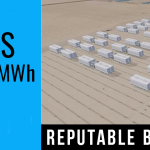
If coronavirus containment measures continue to curtail movement of goods and people through Q2 this year, alongside an economic downturn, the market impact could trim Wood Mackenzie’s 2020 global energy storage deployments forecast by 19%.
This equates to a 3 GWh reduction over the year. Notably, this would still make 2020 a record-breaking year with 12.6 GWh deployed.
Wood Mackenzie’s early estimates indicated a 10% lithium-ion battery supply reduction, mainly due to China’s work restriction measures.
Le Xu, Wood Mackenzie Senior Research Analyst, said: “As this happened in China, Japanese and South Korean facilities ramped up to capitalise on the shortfall. As of March, restrictions have been lifted and production facilities in China are now at 60% to 70% of pre-virus levels.
“As such, the major risks to battery supply have been somewhat mitigated. A similar story has panned out for inverters where major supply risks have also, so far, been alleviated. However, mitigation efforts will likely see the battery supply chain accelerate. This will have far-reaching implications, not just for energy storage but for the global economy too.”
A recession for 2020 is looking imminent and outside of installation restrictions there will be additional downward pressure on demand as consumers spend less on luxury high-cost items, such as residential energy storage.
“For large scale projects, particularly in markets where energy storage is predominantly a merchant play, financiers’ appetite for this type of asset is already being reduced. Final project investment decisions will be pushed further out to when market conditions make the risk-return-ratio for this asset class more palatable.
“On the other hand, interest rates are being slashed to record low levels. This may be a silver lining for financially borderline projects, with lower costs of capital available to help to tip them into the investable category. This will be of particular interest to merchant projects currently seeking finance that typically rely on high-cost equity capital” said Rory McCarthy, Wood Mackenzie Principal Analyst.
The global energy storage market contracted for the first time last year, falling from 6.2 GWh in 2018 to 5.3 GWh in 2019. This contraction was primarily due to market declines in South Korea, China, the UK and Canada, according to Wood Mackenzie’s analysis.
Despite slowdowns in key markets and this year’s coronavirus crisis, the industry should return to growth in 2020.
“It did not take long before cracks appeared in South Korea’s unbelievable 2018 market growth. Since breaking the market record for most storage deployed in a single year, 28 fire incidents were reported, pulling this bull market into a 70% year-over-year decline. 2019 saw over 1 GWh in annual deployment reductions – enough to put a generally slow year into the red in growth terms.





